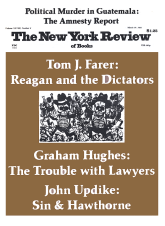In response to:
The Mysteries of Mr. Lippmann from the October 9, 1980 issue
To the Editors:
As Consultant to the New York Public Library’s Schwimmer-Lloyd Collection—a feminist, pacifist, and world government archive built around the voluminous papers of Rosika Schwimmer—I was more than ordinarily interested in references to her citizenship case by Anthony Lewis in his review of Walter Lippmann and the American Century [NYR, Oct. 9]. As part of the evidence of Lippmann’s dismal record on civil liberty is based on Ronald Steel’s two references to Lippmann’s supposed support of the 1929 Supreme Court decision denying citizenship to Rosika Schwimmer because of her refusal to promise to bear arms, I looked up Steel’s references to the case as well as Lippmann’s World editorial.
There are several errors in Steel’s references to the Schwimmer case. On page 233, he claims the Supreme Court “took away the citizenship of a naturalized pacifist….” He is wrong. Rosika Schwimmer, a refugee from white terror-dominated feudal-fascist Hungary, was denied American citizenship in Federal District Court in Chicago; this decision was reversed by the Court of Appeals which ruled that “a petitioner’s rights are not to be determined by putting conundrums to her.” She was never naturalized and died stateless for the Government appealed to the Supreme Court which reversed the Appeals Court decision and denied her citizenship. In his second reference to Schwimmer (page 395), Steel calls her Rosetta instead of Rosika Schwimmer. (Rosika is the Hungarian diminutive of Rose.) And, of course, Anthony Lewis errs in calling her “a Canadian-born pacifist.” He probably mixes her up with the two Canadian-born citizenship applicants who were rejected in 1931, also for refusal to promise to bear arms. They were: Douglas Clyde Macintosh, Yale Professor of Theology, and Marie A. Bland, a nurse.
I next looked up the May 31, 1929, page 14, Lippmann editorial on The Schwimmer Case in The World. (Steel’s reference—May 29, 1929—is incorrect.) The editorial is most erudite and shows that Lippmann, unlike his biographer, had done his homework on the case and fully understood several of its fine points. There is no doubt whatever that the editorial is pro-Schwimmer and gracefully contemptuous of the majority’s reasoning in denying her citizenship. As 99 percent of the editorial comment at the time was pro-Schwimmer and quoted Justice Oliver Wendell Holmes’s dissenting opinion rather than that of the majority, Lippmann was not out of step. Even the usually flag-waving William Randolph Hearst wrote an indignant editorial (embellished with cartoon) denouncing the “six reactionary judges.”
I enclose a copy of the Lippmann editorial so that you can judge for yourself…
Edith Wynner
The Schwimmer-Lloyd Collection
The New York Public Library
Editorial, New York World, May 31, 1929, p. 14:
THE SCHWIMMER CASE
By a vote of 6 to 3, the Supreme Court has held that citizenship should not be granted to anyone who has a conscientious objection to bearing arms. If we read Mr. Justice Butler’s opinion in the Schwimmer case correctly, he holds that under the Constitution no conscientious objector, whether he belongs to a religious sect or is merely an individual conscientious objector, can qualify for citizenship. It will be a little difficult for many persons to understand how, if this be the meaning of the Constitution, so considerable a number of conscientious objectors have in the course of a century and a half, been lawfully admitted to the United States.
As a matter of fact, the Constitution nowhere specifically states that willingness to bear arms is a condition of admission to citizenship. It would probably never have occurred to the authors of the Constitution that the day would come when a woman fortynine years of age, and otherwise qualified, would be refused citizenship because she stated under oath that “I would not take up arms personally if the United States can compel its women citizens to take up arms in defense of the country—something that no other civilized country has ever attempted—I would not be able to comply with this condition of American citizenship. In this case I would recognize the right of the government to deal with me as it is dealing with its male citizens who, for conscientious reasons, refuse to take up arms.”
The position of the majority in the Supreme Court appears to be that Madame Schwimmer’s possible refusal to bear arms in a hypothetical war under a hypothetical law drafting elderly females along with everyone else, would discourage men of military age from doing their duty by their country. It is no wonder that the Circuit Court of Appeals in dealing with this case remarked that “a petitioner’s rights are not to be determined by putting conundrums to her.” The position of the majority of the court would be a good deal simpler to understand if, instead of raising questions which impugn the civic loyalty of Americans so well regarded as the Quakers, they had, if they wished to do so, denied Madame Schwimmer’s application on the narrow ground of the wording of the Naturalization Act. This act says that the applicant for naturalization “shall, before he is admitted to citizenship, declare on oath in open court that he will support and defend the Constitution and laws of the United States against all enemies, foreign and domestic, and bear true faith and allegiance to the same.” It might well be argued that on the strictest and the most literal interpretation of that act Madame Schwimmer could not conscientiously take the oath of citizenship. But even to take this position it would be necessary for the court to declare that the word “defend” means “defend with arms.” It would be necessary for it to declare too that an alien applying for citizenship has less freedom of conscience than a native-born Quaker.
This Issue
March 19, 1981



